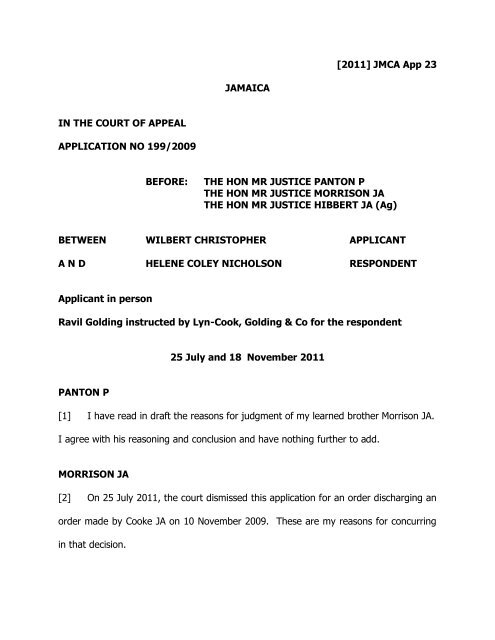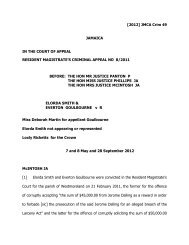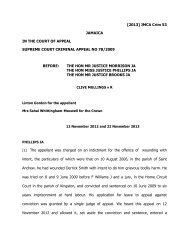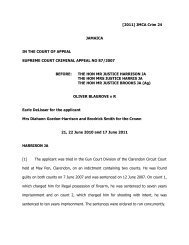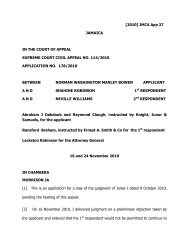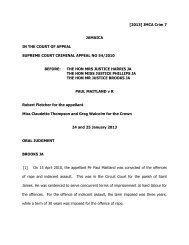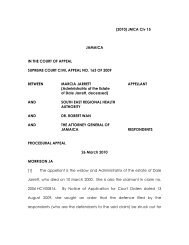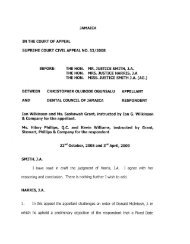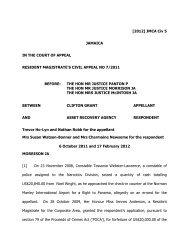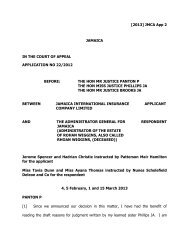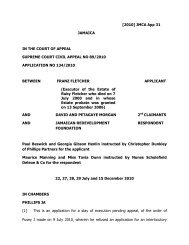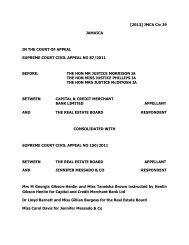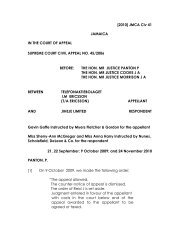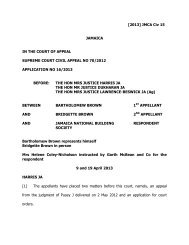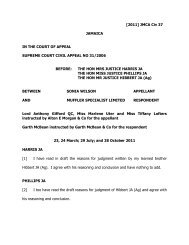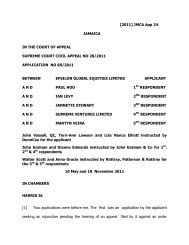Christopher (Wilbert) v Coley Nicholson (Helene).pdf - The Court of ...
Christopher (Wilbert) v Coley Nicholson (Helene).pdf - The Court of ...
Christopher (Wilbert) v Coley Nicholson (Helene).pdf - The Court of ...
- No tags were found...
You also want an ePaper? Increase the reach of your titles
YUMPU automatically turns print PDFs into web optimized ePapers that Google loves.
[2011] JMCA App 23<br />
JAMAICA<br />
IN THE COURT OF APPEAL<br />
APPLICATION NO 199/2009<br />
BEFORE:<br />
THE HON MR JUSTICE PANTON P<br />
THE HON MR JUSTICE MORRISON JA<br />
THE HON MR JUSTICE HIBBERT JA (Ag)<br />
BETWEEN WILBERT CHRISTOPHER APPLICANT<br />
A N D HELENE COLEY NICHOLSON RESPONDENT<br />
Applicant in person<br />
Ravil Golding instructed by Lyn-Cook, Golding & Co for the respondent<br />
25 July and 18 November 2011<br />
PANTON P<br />
[1] I have read in draft the reasons for judgment <strong>of</strong> my learned brother Morrison JA.<br />
I agree with his reasoning and conclusion and have nothing further to add.<br />
MORRISON JA<br />
[2] On 25 July 2011, the court dismissed this application for an order discharging an<br />
order made by Cooke JA on 10 November 2009. <strong>The</strong>se are my reasons for concurring<br />
in that decision.
[3] In early December 2008, the applicant consulted the respondent, who is an<br />
attorney-at-law in private practice, for pr<strong>of</strong>essional advice.<br />
<strong>The</strong> applicant paid the<br />
respondent an initial consultation fee <strong>of</strong> $4,500.00, but a dispute then arose between<br />
them as regards the terms <strong>of</strong> the respondent’s representation <strong>of</strong> the applicant<br />
thereafter. <strong>The</strong> applicant demanded the return <strong>of</strong> the $4,500.00, but the respondent<br />
refused (on grounds which are not now relevant) to make any refund.<br />
[4] As a result, the applicant commenced an action against the respondent to<br />
recover this amount in the Corporate Area Resident Magistrate’s <strong>Court</strong> at Sutton Street.<br />
This matter was set for trial on 5 August 2009. However, by the time the applicant<br />
arrived at court at 10:30 that morning, the matter had already been dealt with in his<br />
absence by the learned Resident Magistrate, who dismissed the applicant’s claim for<br />
want <strong>of</strong> prosecution. <strong>The</strong> court had also, it appears, adjourned for the day. On 4<br />
September 2009, the applicant filed an application to this court for enlargement <strong>of</strong> time<br />
within which to file an appeal from this decision. When this application was referred to<br />
Harris JA as the single judge in chambers, she directed that the application be placed<br />
before a judge in chambers for an inter partes hearing.<br />
[5] By this means, the application therefore came before Cooke JA in chambers on<br />
10 November 2009, at which time the applicant was present, but the respondent was<br />
neither present nor represented. Cooke JA dismissed the application, apparently on the<br />
ground that the appeal was premature, in that the applicant ought to have made an<br />
application to the Resident’s Magistrate <strong>Court</strong> to set aside the order made in his
absence on 5 August 2009 dismissing the action against the respondent for want <strong>of</strong><br />
prosecution.<br />
[6] Before us, the applicant’s grounds for seeking to discharge Cooke JA’s order<br />
were that Cooke JA (a) had on 10 November 2009 ruled in the respondent’s favour in<br />
her absence; (b) had refused to allow him to make a submission to the court; and (c)<br />
failed to comply with Harris JA’s order that the matter be placed before a judge in<br />
chambers for an inter partes hearing.<br />
[7] In an affidavit sworn to on 17 November 2009 and filed in support <strong>of</strong> the<br />
application, the applicant complained that Cooke JA acted “in conflict <strong>of</strong> the decision <strong>of</strong><br />
[Harris JA]”. <strong>The</strong> affidavit was silent as to the factual basis upon which an extension <strong>of</strong><br />
time was being sought, although in a document headed “Point <strong>of</strong> Note”, which was filed<br />
in this court on 31 January 2011, the applicant sought to advance a number <strong>of</strong><br />
complaints.<br />
Firstly, the applicant contended, the decision <strong>of</strong> the learned Resident<br />
Magistrate who originally set his matter for trial on 5 August 2009, at a time “when the<br />
court would be on recess”, and not in “the small claim court”, was unjust. Secondly,<br />
that the decision <strong>of</strong> the learned Resident Magistrate “to struck [sic] out the claim at 10<br />
am on the morning <strong>of</strong> the 5 th August 2010 is unjust as the appellant was not given<br />
time to arrive for the trial as he had arrive at 10 30/am and was told that the court was<br />
closed for the day”. And thirdly, that “the clerk <strong>of</strong> the court refusal to accept the<br />
appellant [sic] deposit for the security <strong>of</strong> cost for the notice <strong>of</strong> appeal was an abuse <strong>of</strong><br />
her power and <strong>of</strong>fice as the matter should have gone before the senior RM”.
[8] Mr Ravil Golding for the respondent contented himself with a couple <strong>of</strong> simple<br />
points, firstly, that no good reason had been put forward by the applicant for the failure<br />
to file his appeal from the order <strong>of</strong> the Resident Magistrate in time, and secondly, that<br />
there was, in any event, no merit in the applicant’s substantive claim.<br />
[9] In my view, Mr Golding was plainly correct in both these submissions. In<br />
Leymon Strachan v <strong>The</strong> Gleaner Company Ltd and Dudley Stokes (Motion No.<br />
12/1999, judgment delivered 6 December 1999), this court held that on an application<br />
for extension <strong>of</strong> time to file an appeal, the applicant will generally be expected to show<br />
(i) some satisfactory reason for the delay, and (ii) that there is some substance in the<br />
intended appeal (see per Harrison JA, as he then was, at pages 5 – 7 and Panton JA, as<br />
he then was, at page 17). In order to succeed on his application before Cooke JA,<br />
therefore, the applicant was required to show that he had a good explanation for not<br />
having filed the appeal within time and that he had an appeal that had some chance <strong>of</strong><br />
success.<br />
[10] I am clearly <strong>of</strong> the view that neither <strong>of</strong> these criteria was satisfied in this case<br />
and that Cooke JA was correct to dismiss the application for leave to appeal out <strong>of</strong> time.<br />
As regards the first, the only hint in the material placed before the court by the<br />
applicant <strong>of</strong> the circumstances in which he came to miss the deadline for filing his<br />
appeal from the decision <strong>of</strong> the Resident Magistrate is to be found in the laconic<br />
reference in his “Point <strong>of</strong> Note” to “the clerk <strong>of</strong> court refusal to accept the appellant<br />
deposit for the security <strong>of</strong> cost for the notice <strong>of</strong> appeal”. I have been completely unable<br />
to extract anything meaningful from this statement and certainly nothing by way <strong>of</strong> an
explanation for the filing <strong>of</strong> the appeal out <strong>of</strong> time in the first place. As regards the<br />
second criterion, the applicant’s position strikes me as equally unpromising. By his own<br />
account, the applicant arrived half an hour late for court on 5 August 2009 and, in the<br />
absence <strong>of</strong> any reason having been advanced by him to suggest that the Resident<br />
Magistrate exceeded her authority or misused her discretion in deciding to strike out the<br />
claim for want <strong>of</strong> prosecution, it seems to me that an appeal from that decision would<br />
be bound to fail.<br />
[11] For completeness, I should add that, in my view, nothing at all turns on the<br />
three grounds <strong>of</strong> challenge to Cooke JA’s decision which were put forward by the<br />
applicant (see para. [5] above). In the first place, there is no rule <strong>of</strong> either law or<br />
practice that precludes a court from ruling in favour <strong>of</strong> a party who is absent from the<br />
hearing at which the ruling is made; secondly, there is nothing on the record to suggest<br />
that the applicant was in any way deprived <strong>of</strong> an opportunity to advance anything that<br />
he wished to put forward at the hearing before Cooke JA; and thirdly, Harris JA’s order<br />
that the matter be placed before a judge in chambers for an inter partes hearing could<br />
in no way fetter or circumscribe the full discretion <strong>of</strong> the judge who actually heard the<br />
application to deal with the matter as best as he thought appropriate in all the<br />
circumstances <strong>of</strong> the case.
[12] I would accordingly dismiss this application, with costs to the respondent, fixed<br />
at $15,000.00.<br />
HIBBERT JA (Ag.)<br />
[13] I too have read the reasons for judgment <strong>of</strong> Morrison JA and I agree with his<br />
reasoning and conclusion.


